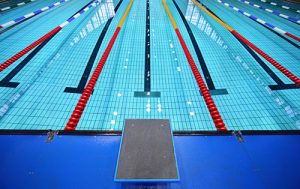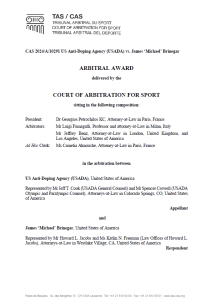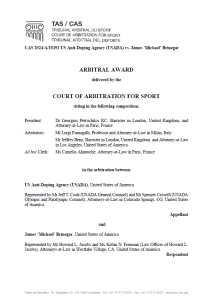 USADA announced today that a three-arbitrator panel of the Court of Arbitration for Sport (CAS) has rendered a decision in an appeal after USADA challenged the initial decision in the case of swimming athlete James “Michael” Brinegar of Columbus, Ohio. Brinegar’s case was heard to ensure resolution in advance of team selection decisions related to the upcoming Paris Olympic Games.
USADA announced today that a three-arbitrator panel of the Court of Arbitration for Sport (CAS) has rendered a decision in an appeal after USADA challenged the initial decision in the case of swimming athlete James “Michael” Brinegar of Columbus, Ohio. Brinegar’s case was heard to ensure resolution in advance of team selection decisions related to the upcoming Paris Olympic Games.
The CAS award sets aside the initial decision that Brinegar did not commit a rule violation and instead imposes a four-year sanction for Brinegar’s use of a prohibited substance and/or method resulting in an Adverse Passport Finding after highly abnormal blood values in his Athlete Biological Passport (ABP) were identified as being caused by blood doping.
The hematological ABP was launched in 2009 and comprises an individualized longitudinal data set designed to evaluate athletes’ various blood biomarkers over time. Blood doping methods such as blood transfusions and the use of Erythropoietic Stimulating Agents (ESAs) like erythropoietin (EPO) have measurable effects on certain biomarkers in the blood. By analyzing an athlete’s blood values over time, experts can identify atypical patterns associated with blood doping while excluding natural variability. In this case, three samples collected from Brinegar between July 20, 2022 and September 27, 2022 showed values consistent with blood doping, specifically the use of ESAs, as confirmed by unanimous expert evaluation of Brinegar’s blood profile in early 2023.
The use or attempted use of ESAs and manipulation of blood or blood components, including, but not limited to blood transfusions, are prohibited at all times under the USADA Protocol for Olympic and Paralympic Movement Testing, the United States Olympic & Paralympic Committee (USOPC) National Anti-Doping Policies, and the World Aquatics Doping Control Rules, all of which have adopted the World Anti-Doping Code (the Code) and the World Anti-Doping Agency Prohibited List.
Brinegar’s four-year period of ineligibility began on June 21, 2024, the date the CAS panel’s decision was issued. He receives credit for the time he was provisionally suspended from August 18, 2023 to November 27, 2023. In addition, Brinegar has been disqualified from all competitive results from July 20, 2022 through December 31, 2022, the dates encompassing his abnormal blood samples, including forfeiture of any medals, points, and prizes.

Given the athlete’s comments prior to this release, it’s worth noting that, under the rules, athletes are eligible for a one-year reduction to the default four-year period of ineligibility for admitting to a violation within a specific time frame, and USADA provides notice of this eligibility, as required by the rules. In cases like this, where others may be involved, USADA also investigates and seeks any and all information about other athletes or support personnel who may have assisted in the violation. And under the rules, an athlete’s substantial assistance can result in a reduction to their period of ineligibility based on the extent of the cooperation and evidence provided regarding others’ violations. Brinegar retained legal counsel after being charged with a violation and chose to proceed to arbitration. As required by the rules, WADA, the International Testing Agency, USA Swimming, and the USOPC were notified of the initial decision, and the CAS decision has now been publicly released since a violation and sanction have been imposed.
Because a decision was needed before team selection decisions were made, the CAS panel issued an operative award, which is an abbreviated document that only conveys the panel’s ruling. The operative award can be found here, and the reasoned decision will be made publicly available once it is rendered.
In an effort to aid athletes, as well as support team members such as parents and coaches, in understanding the rules applicable to them, USADA provides comprehensive instruction on its website on the testing process and prohibited substances, how to file and update athlete Whereabouts, how to obtain permission to use a necessary medication, and the risks and dangers of taking supplements, as well as performance-enhancing and recreational drugs.

In addition, USADA manages a drug reference hotline, Global Drug Reference Online (GlobalDRO.com), conducts educational sessions with National Governing Bodies and their athletes, and distributes a multitude of educational materials, such as a supplement guide, a nutrition guide, a clean sport handbook, and periodic alerts and advisories.
USADA makes available a number of ways to report the abuse of performance-enhancing drugs in sport in an effort to protect clean athletes and promote clean competition. Any tip can be reported using the USADA Play Clean Tip Center, by text at 87232 (“USADA”), by email at playclean@USADA.org, by phone at 1-877-Play Clean (1-877-752-9253) or by mail.
USADA is responsible for the testing and results management process for athletes in the U.S. Olympic and Paralympic Movement and is equally dedicated to preserving the integrity of sport through research initiatives and educational programs.
For more information or media inquiries, email media@usada.org.



